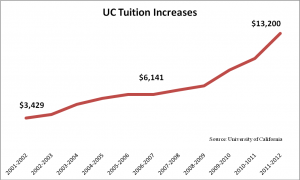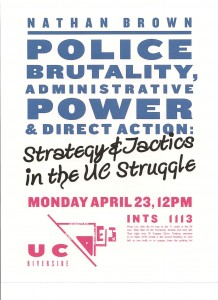Council of UC Faculty Associations
15 Shattuck Square, Suite 200
Berkeley, CA 94704
800 431-3348
November 27, 2011
President Mark G. Yudof
University of California
1111 Franklin St., 12th Floor
Oakland, CA 94607
Fax: (510) 987-9086
Dear President Yudof,
The Council of University of California Faculty Associations (CUCFA) protests your decision to hire the Kroll Security Group, and its Chairman William Bratton, to conduct what you call an independent investigation of police violence at UC Davis. We take no position here on Mr. Bratton’s personal qualifications; our objection is to the conflicts of interest of Kroll Security itself, which is already a major contractor with UC on security matters. According to its website, Kroll’s services are not confined to securing databases and facilities from attacks by criminals and terrorists. It also protects many global financial institutions and other multinationals against threats to “operations” that may come from public criticism and direct political action.
By deepening UC’s links to Kroll, you would be illustrating the kinds of connection between public higher education and Wall Street that the Occupy UC movement is protesting. Kroll’s parent company, Altegrity, provides data-mining, intelligence and on-the-ground security to financial institutions and governments seeking to head off and defeat both private sabotage and public protest. In addition, Altegrity’s parent company, Providence Private Equity, is a major global investor in for-profit higher education companies that benefit from the decline of publicly funded higher education.
We already know that Kroll has provided security services to at least three UC campuses for the past several years. This in itself would disqualify Mr. Bratton from participating in the investigation you propose, even if the role of Kroll and its affiliated companies in defending the financial sector against OWS did not raise further questions about its pro-Wall Street and pro-privatization bias.
A truly independent investigation that would allow UC to provide a credible response to the events at Davis (and the other campuses) needs to address several questions that would not be seriously considered if you hire Kroll.
• What was your role and that of UC General Counsel in the events at Davis? Did you, as a distinguished first amendment scholar, tell chancellors and campus police chiefs that protests (especially protests against UC’s own policies) are “part of the DNA of this University” that should not be addressed using the same techniques that UC has developed (likely with the help of Kroll) to deal with terrorists, shooters, and cyber-saboteurs? (Even if you have been a zealous defender of the rising student movement to restore public higher education, such a conclusion would not be credible coming from an investigation tainted by Kroll’s conflicts of interest outlined above.)
• What was and is the role of Kroll in helping banks and public institutions (including UC) investigate and defeat movements such as OWS and their campus counterparts? Is Kroll now acting as a liaison between universities, city governments and the Department of Homeland Security in defending the financial sector against protests occurring on what used to be considered public spaces? Are protests against Wall Street in such spaces now considered a threat to the security of the nation, the city and the public university? (The growing securitization of public space has been a major obstacle to first amendment activity since 9-11.)
• How much money has UC and its individual campuses paid to Kroll for security services? Were these contracts issued as sole source contracts or was there open bidding? Were Kroll’s services confined to protecting, for example, the privacy and integrity of data systems and faculty and staff conducting animal research or did they extended to what Kroll’s website calls “organizational threats” arising from “the dynamic and sometimes conflicting needs of the entire campus population”? (This could be a description of the student protests that you rightly regard as “central to our history” as a university.)
• What led to the issuance of false and misleading statements by University of California officials (Chancellors and their assistants, spokespeople, and police chiefs) in the aftermath of police violence at Berkeley and Davis? Did you encourage these efforts at spin control? (Dishonest statements seriously damage the university as an institution devoted to truth and protect only the individuals whose decisions are in question.)
The broader issue is how protest can be part of what you characterized as “our university’s DNA” when the right to protest is not formally recognized within the university’s own codes of student and faculty conduct. It could be and should be. The CSU student code states explicitly that “[n]othing in this Code may conflict with Education Code Section 66301 that prohibits disciplinary action against students based on behavior protected by the first amendment.” If such language were included in the UC code of conduct, students would have a clear first amendment defense against disciplinary action arising from peaceful political protest—and there would be strong grounds for questioning the legality of a police order to disperse a peaceful protest from a public site on a public university campus. The explicit incorporation of constitutional limits on UC’s power to break up
demonstrations that threaten its march toward privatization would go a long way toward recovering UC as a public, rather than a private, space. We urge you to see that the UC codes of conduct are amended to parallel those in place at CSU.
Events at Davis and the other campuses have shown the University of California in a negative light, and we agree strongly with the need for an independent investigation. We believe, however, that your appointment of Kroll to investigate the university’s response to last week’s protest could itself become a basis for new protests, and that you should ask Speaker Pérez (or someone unaffiliated with the University) to appoint a genuinely independent committee with representatives from student, faculty, staff and civil liberties groups. Such a committee should be given a specific charge to investigate and report on all of the questions set forth above.
Robert Meister,
President, Council of UC Faculty Associations
Professor History of Consciousness and Political and Social Thought, UC Santa Cruz
(831) 212-3040
rlmeister@earthlink.net


